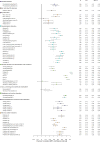Validity and Reliability of the US National Cancer Institute's Patient-Reported Outcomes Version of the Common Terminology Criteria for Adverse Events (PRO-CTCAE)
- PMID: 26270597
- PMCID: PMC4857599
- DOI: 10.1001/jamaoncol.2015.2639
Validity and Reliability of the US National Cancer Institute's Patient-Reported Outcomes Version of the Common Terminology Criteria for Adverse Events (PRO-CTCAE)
Erratum in
-
Error in Abstract Results.JAMA Oncol. 2016 Jan;2(1):146. doi: 10.1001/jamaoncol.2015.6255. JAMA Oncol. 2016. PMID: 26767562 No abstract available.
Abstract
Importance: To integrate the patient perspective into adverse event reporting, the National Cancer Institute developed a patient-reported outcomes version of the Common Terminology Criteria for Adverse Events (PRO-CTCAE).
Objective: To assess the construct validity, test-retest reliability, and responsiveness of PRO-CTCAE items.
Design, setting, and participants: A total of 975 adults with cancer undergoing outpatient chemotherapy and/or radiation therapy enrolled in this questionnaire-based study between January 2011 and February 2012. Eligible participants could read English and had no clinically significant cognitive impairment. They completed PRO-CTCAE items on tablet computers in clinic waiting rooms at 9 US cancer centers and community oncology practices at 2 visits 1 to 6 weeks apart. A subset completed PRO-CTCAE items during an additional visit 1 business day after the first visit.
Main outcomes and measures: Primary comparators were clinician-reported Eastern Cooperative Oncology Group Performance Status (ECOG PS) and the European Organisation for Research and Treatment of Cancer Core Quality of Life Questionnaire (QLQ-C30).
Results: A total of 940 of 975 (96.4%) and 852 of 940 (90.6%) participants completed PRO-CTCAE items at visits 1 and 2, respectively. At least 1 symptom was reported by 938 of 940 (99.8%) participants. Participants' median age was 59 years; 57.3% were female, 32.4% had a high school education or less, and 17.1% had an ECOG PS of 2 to 4. All PRO-CTCAE items had at least 1 correlation in the expected direction with a QLQ-C30 scale (111 of 124, P<.05 for all). Stronger correlations were seen between PRO-CTCAE items and conceptually related QLQ-C30 domains. Scores for 94 of 124 PRO-CTCAE items were higher in the ECOG PS 2 to 4 vs 0 to 1 group (58 of 124, P<.05 for all). Overall, 119 of 124 items met at least 1 construct validity criterion. Test-retest reliability was 0.7 or greater for 36 of 49 prespecified items (median [range] intraclass correlation coefficient, 0.76 [0.53-.96]). Correlations between PRO-CTCAE item changes and corresponding QLQ-C30 scale changes were statistically significant for 27 prespecified items (median [range] r=0.43 [0.10-.56]; all P≤.006).
Conclusions and relevance: Evidence demonstrates favorable validity, reliability, and responsiveness of PRO-CTCAE in a large, heterogeneous US sample of patients undergoing cancer treatment. Studies evaluating other measurement properties of PRO-CTCAE are under way to inform further development of PRO-CTCAE and its inclusion in cancer trials.
Figures



Comment in
-
PROceeding With the Patient-Reported Outcomes (PROs) Version of the Common Terminology Criteria for Adverse Events.JAMA Oncol. 2015 Nov;1(8):1059-60. doi: 10.1001/jamaoncol.2015.2689. JAMA Oncol. 2015. PMID: 26270250 No abstract available.
References
-
- National Cancer Institute, National Institutes of Health, U.S. Department of Health and Human Services. Common Terminology Criteria for Adverse Events (CTCAE) Version 4.0. [last accessed March 16, 2015];NIH publication # 09-7473. Published May 29, 2009; Revised Version 4.03 June 14, 2010. Available at http://evs.nci.nih.gov/ftp1/CTCAE/CTCAE_4.03_2010-06-14_QuickReference_5....
-
- National Cancer Institute, National Institutes of Health, U.S. Department of Health and Human Services. [last accessed March 16, 2015];caBIG Knowledge Center, CTCAE FAQ. Available at http://evs.nci.nih.gov/ftp1/CTCAE/Archive/CTCAE_4.01_2009-07-14_FAQ.doc.
-
- Trotti A, Colevas AD, Setser A, Basch E. Patient-Reported Outcomes and the Evolution of Adverse Event Reporting in Oncology. J Clin Oncol. 2007;25(32):5121–7. - PubMed
Publication types
MeSH terms
Substances
Grants and funding
LinkOut - more resources
Full Text Sources
Other Literature Sources
Medical
Miscellaneous

